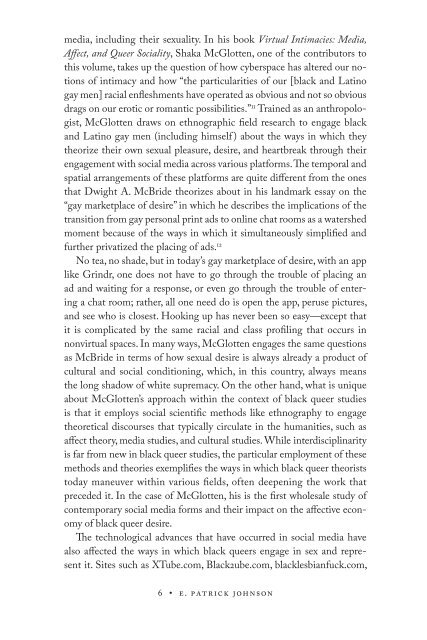No Tea
89AS6wvrf
89AS6wvrf
You also want an ePaper? Increase the reach of your titles
YUMPU automatically turns print PDFs into web optimized ePapers that Google loves.
media, including their sexuality. In his book Virtual Intimacies: Media,<br />
Affect, and Queer Sociality, Shaka McGlotten, one of the contributors to<br />
this volume, takes up the question of how cyberspace has altered our notions<br />
of intimacy and how “the particularities of our [black and Latino<br />
gay men] racial enfleshments have operated as obvious and not so obvious<br />
drags on our erotic or romantic possibilities.” 11 Trained as an anthropologist,<br />
McGlotten draws on ethnographic field research to engage black<br />
and Latino gay men (including himself ) about the ways in which they<br />
theorize their own sexual plea sure, desire, and heartbreak through their<br />
engagement with social media across vari ous platforms. The temporal and<br />
spatial arrangements of these platforms are quite differ ent from the ones<br />
that Dwight A. McBride theorizes about in his landmark essay on the<br />
“gay marketplace of desire” in which he describes the implications of the<br />
transition from gay personal print ads to online chat rooms as a watershed<br />
moment because of the ways in which it si mul ta neously simplified and<br />
further privatized the placing of ads. 12<br />
<strong>No</strong> tea, no shade, but in today’s gay marketplace of desire, with an app<br />
like Grindr, one does not have to go through the trou ble of placing an<br />
ad and waiting for a response, or even go through the trou ble of entering<br />
a chat room; rather, all one need do is open the app, peruse pictures,<br />
and see who is closest. Hooking up has never been so easy— except that<br />
it is complicated by the same racial and class profiling that occurs in<br />
nonvirtual spaces. In many ways, McGlotten engages the same questions<br />
as McBride in terms of how sexual desire is always already a product of<br />
cultural and social conditioning, which, in this country, always means<br />
the long shadow of white supremacy. On the other hand, what is unique<br />
about McGlotten’s approach within the context of black queer studies<br />
is that it employs social scientific methods like ethnography to engage<br />
theoretical discourses that typically circulate in the humanities, such as<br />
affect theory, media studies, and cultural studies. While interdisciplinarity<br />
is far from new in black queer studies, the par tic u lar employment of these<br />
methods and theories exemplifies the ways in which black queer theorists<br />
today maneuver within vari ous fields, often deepening the work that<br />
preceded it. In the case of McGlotten, his is the first wholesale study of<br />
con temporary social media forms and their impact on the affective economy<br />
of black queer desire.<br />
The technological advances that have occurred in social media have<br />
also affected the ways in which black queers engage in sex and represent<br />
it. Sites such as XTube . com, Black2ube . com, blacklesbianfuck . com,<br />
6 • E. Patrick Johnson


